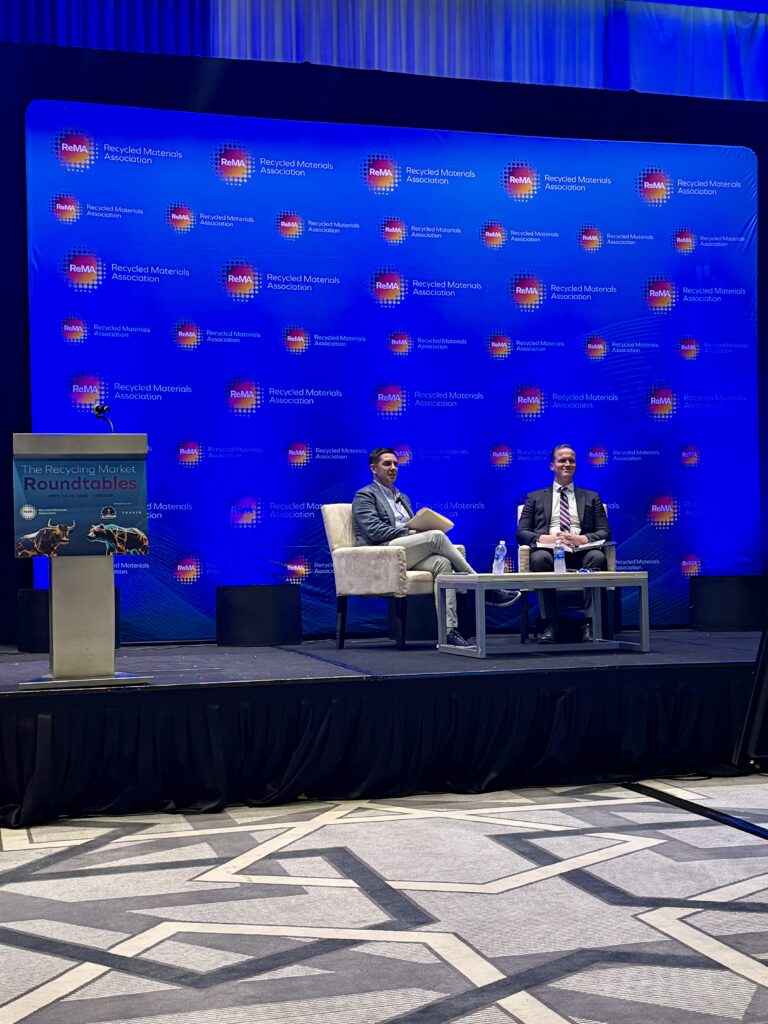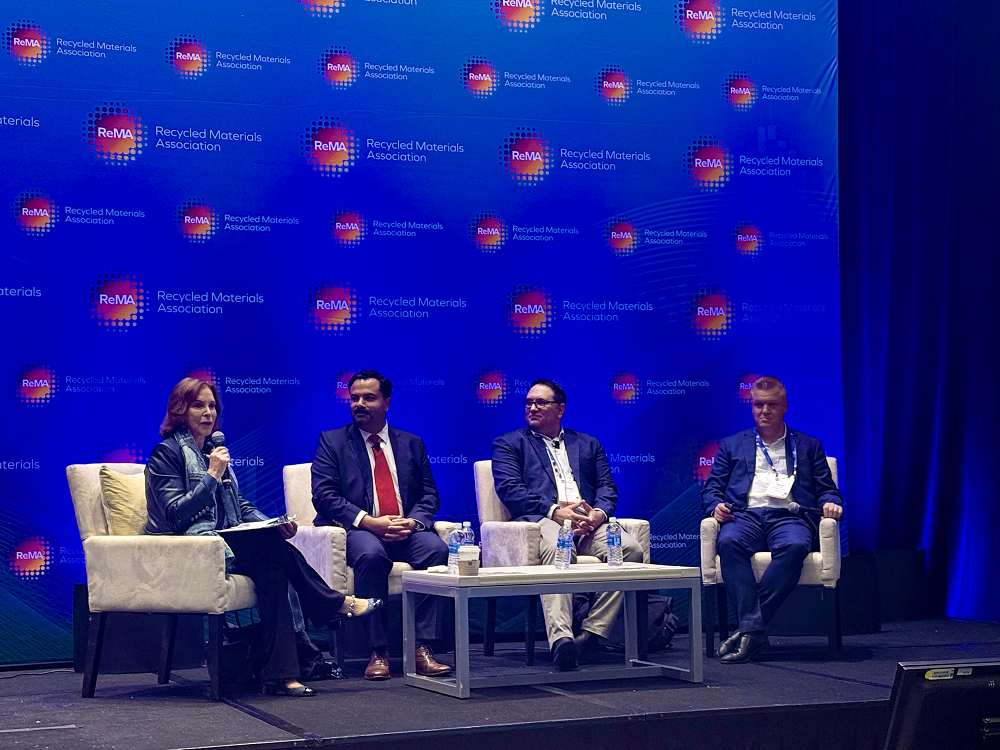Days of the Roundtables: Copper Growth, Nickel/Stainless Demand, and Engaging with USTR on Tariff Impacts
From Wednesday, September 10, to Friday, September 12, 2025, traders, processors, and consumers across the U.S. and abroad congregated in Chicago for the ReMA 2025 Roundtables. This two-and-a-half-day event featured massive networking opportunities in tandem with expert market analysis.
Copper Roundtable
Copper was highlighted as a long-term growth metal by Josh Werner, CEO of Recyera, Naveed Moghadam, Commercial Director at Aurubis, and David Brooks, Global Head of Metals at Argus Media. The session was moderated by Terry Savage.
Savage began by asking the panelists for their opinions about what’s going on in the copper markets. “The long-term outlook is copper is going to be a critical metal for the future and in high demand,” she said.
Brooks reviewed the copper markets for the first half of 2025, noting the large spike in price in July when President Trump announced the 50% tariff on copper and the market assumed he had meant copper cathodes rather than copper products.
“Perhaps we should have seen it coming, but the market didn’t see it coming,” Brooks said when asked about how big of a shock it was that the tariffs weren’t on copper cathodes. “The market needs cathode imports and there was a realization that it didn’t make sense in its initial incarceration. The tariff on copper products is designed to encourage new mills in the U.S. and more domestic production.”
He added that the energy transition to electric vehicles is a big part of the story. People are expecting a huge boom in EVs, but vehicle sales have been lackluster in the U.S.
Brooks said the U.S. has been slower to adopt these vehicles than elsewhere in the world. Werner shared information about his company, Recycera, noting the importance of advancing technologies that can improve metals recovery.
“Recycera is looking to fill the niche when the material is too fine for hand or sensor sorting and you can’t get the full material out of smelters,” he said. “We have two pilot plants in Lexington, Kentucky. We’re applying science and technology to enhance the efficiencies and effectiveness of metal recovery.”
Moghadam discussed Aurubis’ new facility in Augusta, Georgia, noting that the location has a fully constructed first smelter of its kind in North America and will be doing its first melt in a couple of weeks.
“We are ramping up through the end of the year into next year,” he said. “We wanted to be the first mover against our competition. In Europe there are several other smelters we compete with for materials. We see the U.S. a key and growing market where development is happening. We wanted to be one of the first players to support manufacturing being reshored to North America.”
Nickel/Stainless Roundtable
Nickel/ Stainless Roundtable panelists Amy Hinton, North American Scrap Editor at Fastmarkets, Alasdair Gledhill, Chief Marketing Officer at Allied Alloys, and Colin Strang, President of BM Buffalo, shared the latest information about nickel/stainless, including the demand for stainless being impacted by consumer purchases and a hope for upticks.

Hinton set the stage by discussing what’s happened to the nickel/stainless market over the last several months and where the market is today.
“Like most commodities, the market was struggling under the yolk of stagflation, there are a lot of eyes on the Federal Reserve’s meeting on September 16 and 17, where they are expected to slash interest rates,” she said.
When asked about how much of the demand for stainless is impacted by consumer purchases, Hinton noted that the end use markets for stainless are often consumer goods and household goods, so it does have a real impact on demand.
Gledhill discussed the conditions of the recycled stainless/nickel market, noting that the price has been slowly declining for the whole year.
“If you’re a recycler, you’re likely buying the material today and turning it around in 30 days to sell it into a lower market almost consistently this year that’s what everyone is concerned about what and what will be the catalyst to get nickel out of a surplus and back into balance,” he said.
Strang talked about EV batteries, and his view of the timeline of battery tech development versus penetration for EVs.
“The lithium-ion battery took 40 years from initial conception to mass commercialization,” he said. “That product lifecycle was massive. Now, we’re getting technology changes in two to three years, so things are changing at such a fast pace. There isn’t one correct battery chemistry because if you’re doing a plug-in or fully electric car, or if the battery is being made in the East or the West. There are a lot of different factors.”
Trade and Tariff
For the last panel on day two, Dan Matthews, Director of Industrial Competitiveness at the Office of the U.S. Trade Representative (USTR) and Adam Shaffer, ReMA’s Vice President of International Trade and Global Affairs, discussed the international tariffs and shifting trade policies reshaping the recycled materials market.

Matthews discussed upcoming opportunities for stakeholders to provide comments as the U.S. government evaluates how to respond to unfair trade practices by other countries that threaten U.S. security.
“The Commerce Department is getting ready to launch a second inclusion window,” he said. “We’ve been engaging with a variety of stakeholders across industries that face similar challenges in terms of sourcing components and manufacturing equipment. We know manufactures support the President’s agenda and want to revitalize American manufacturing, but they need to secure certain components from foreign sources,” Matthews said. “We are trying to access various supply chains for these products and where do we have critical shortages of inputs what types of manufacturing equipment are produced in the U.S. and do we have the ability to explore further investments. The goal is to incentivize manufacturing in the U.S.”
He added what what’s helpful for both the USTR and the Department of Commerce is to hear from industries how the tariffs are impacting them directly. Matthews encouraged attendees to submit public comments and for ReMA to request meetings with USTR and the Department of Commerce.
“We want to be able to really understand the impacts of this action and any unintended consequences,” he said. “So, please engage in the process.”
